How to Choose and Brew Organic Loose Leaf Tea: A Step-by-Step Guide

Overview
When it comes to choosing and brewing organic loose leaf tea, it's essential to prioritize factors that resonate with your wellness journey. Consider:
- USDA Organic certification
- The source of the tea
- The quality of the foliage
- Your personal flavor preferences
By following specific brewing techniques, you can achieve optimal flavor extraction that truly enhances your experience.
Understanding these elements not only enriches your tea-drinking experience but also aligns beautifully with your health and sustainability goals. Imagine savoring a cup of tea that not only delights your senses but also reflects your commitment to quality and eco-friendly practices. This journey towards a more mindful selection process is about nurturing both your body and the planet.
As you explore the world of organic loose leaf tea, remember that each cup is an opportunity to connect with nature. Embrace the flavors and aromas that speak to you, and let your preferences guide your choices. Your tea ritual can be a wonderful way to practice self-care, making each moment spent with your tea a cherished experience.
Introduction
In a world that increasingly embraces health and sustainability, organic loose leaf tea has become a beloved choice for those who seek both delightful flavors and wellness benefits. Unlike conventional teas, these blends are lovingly crafted from whole leaves, grown without synthetic pesticides or fertilizers, offering a richer taste and a wealth of health advantages. Imagine sipping a warm cup that not only promotes relaxation and supports immune function but is also rich in antioxidants. Organic loose leaf teas tantalize the palate while aligning with a holistic approach to well-being.
As you navigate your wellness journey, understanding the nuances of selecting and brewing these teas can truly enhance your experience. With so many unique offerings available in the market today, we invite you to explore and discover the delightful possibilities that await. What flavors resonate with your senses? Take a moment to reflect on how these nourishing blends can enrich your daily routine.
Understanding Organic Loose Leaf Tea: Benefits and Appeal
Organic loose leaf tea is lovingly crafted from whole tea leaves, grown without synthetic pesticides and fertilizers, making it a superior choice compared to conventional tea. The benefits of organic loose leaf tea are truly remarkable:
- Promoting Wellness and Balance: At Gardenika, our organic loose leaf teas are thoughtfully created with time-tested herbs that support your body's natural processes. Each blend is designed to encourage relaxation and bolster your immune system, making them an excellent addition to a wellness-focused lifestyle.
- Rich in Antioxidants: These teas are brimming with antioxidants, which are essential for combating oxidative stress and may help lower the risk of chronic diseases. Research shows that the antioxidant levels in organic loose leaf tea can be significantly higher than those found in conventional tea, enhancing their health-promoting properties. In contrast, consuming large amounts of mate over time may increase the risk of certain cancers, emphasizing the importance of choosing high-quality tea options.
- Enhanced Flavor: Loose tea offers a more robust flavor profile. As Cindy Li, Founder of Uproot Teas, beautifully states, "It often has many layers of flavors." The whole leaves fully expand during brewing, allowing for the release of essential oils and flavors that create a richer tasting experience.
- Specific Health Advantages: Many herbal infusions, including those from Gardenika, are celebrated for their unique health benefits. For example, certain blends can aid digestion, boost immunity, and promote relaxation, making them a valuable addition to your daily routine. Customer testimonials often highlight improvements in overall well-being after incorporating these teas into their lives.
- Sustainability: Choosing natural tea supports eco-friendly agricultural methods that benefit our environment. Gardenika emphasizes sustainable packaging and natural sourcing, ensuring that each product reflects a commitment to health and environmental responsibility. This dedication not only enhances the health benefits of our beverages but also contributes positively to our planet, as shown in case studies on sustainability and eco-friendly practices.
In summary, organic loose leaf tea not only provides a delightful drinking experience but also plays a significant role in promoting health and wellness, making it an excellent choice for those seeking natural solutions in their daily lives. However, it is important to note that large-scale, well-controlled human clinical trials are necessary to establish the health-promoting effects of tea consumption, underscoring the ongoing research in this field. Shop now to discover the USDA Organic and Kosher certified loose herbal infusions and experience the benefits for yourself.
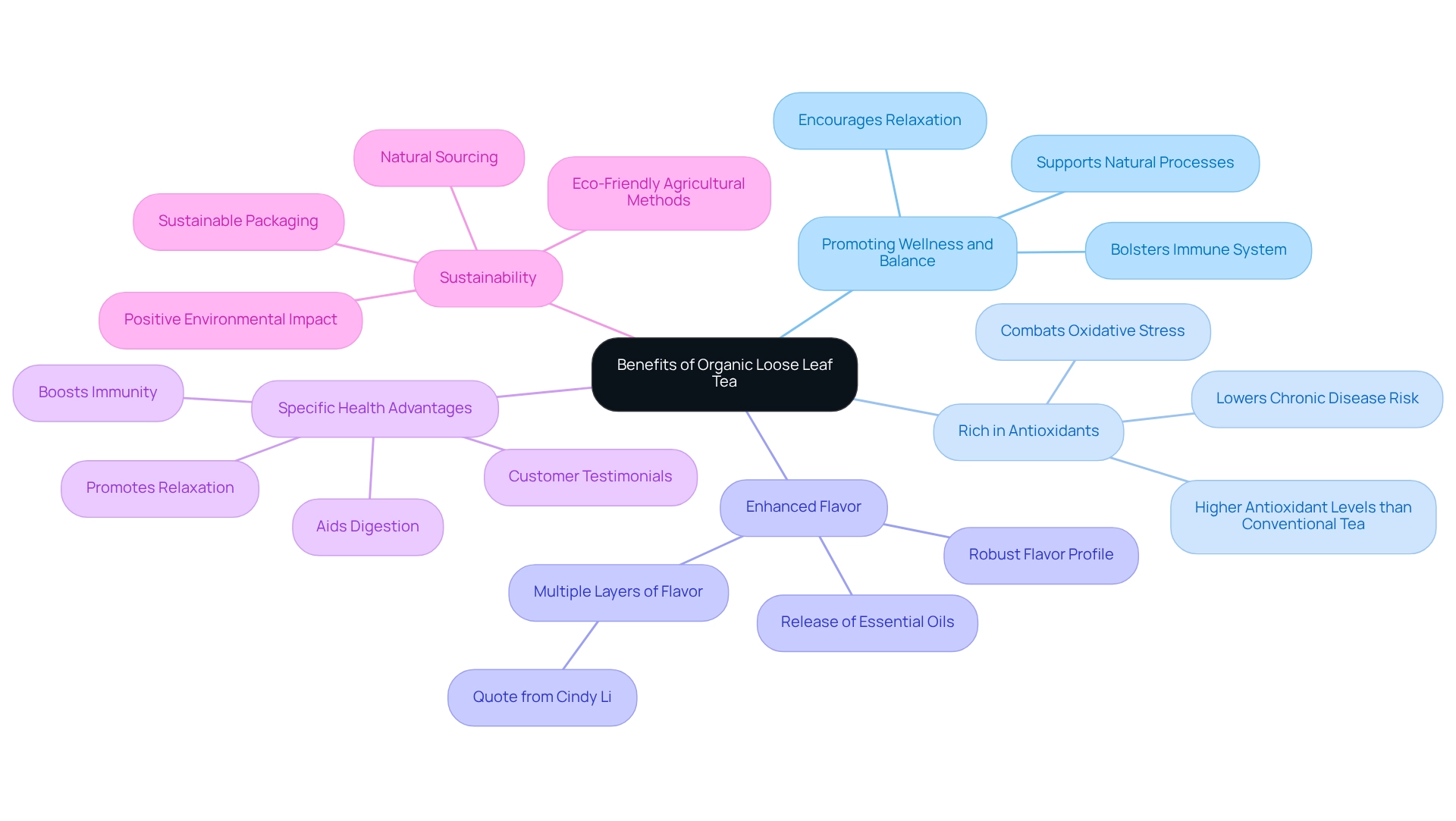
Key Factors to Consider When Choosing Organic Loose Leaf Tea
When selecting organic loose leaf tea, several key factors should guide your decision-making process:
- Certification: Prioritize USDA Organic certification, which guarantees that the tea is cultivated without harmful chemicals or synthetic fertilizers. At Gardenia, our teas comply with rigorous natural standards, ensuring sustainability for both you and the environment. Additionally, our KSA Kosher certification reflects our adherence to strict kosher laws for quality and care. This certification is becoming increasingly significant, as studies indicate that over 70% of consumers favor natural products, reflecting a rising awareness of health and environmental concerns. Furthermore, the USDA has created the Organic Transition Initiative with $300 million to support farmers transitioning to organic production, highlighting the commitment to organic practices.
- Source: Investigate the origin of the tea. Premium beverages are frequently obtained from prestigious areas, such as Darjeeling in India or Uji in Japan, recognized for their distinctive flavor profiles and farming methods. The geographical source can significantly influence the tea's taste and quality.
- Foliage Quality: Evaluate the appearance of the foliage. High-quality organic loose leaf tea, such as those from Gardenia, should showcase whole, lively foliage that is free from dust and fragmented parts. The integrity of the leaves is a strong indicator of freshness and quality, which directly impacts the flavor and health benefits.
- Flavor Profile: Reflect on your personal taste preferences. Different types of tea—such as green, black, or herbal—offer distinct flavors and health benefits. For instance, green tea is celebrated for its antioxidant properties, while herbal blends may provide calming effects.
- Freshness: Always check the packaging date. Fresh tea retains more flavor and health benefits, making it essential to choose products that have been recently packaged. As a general guideline, aim to buy beverages that have been packaged within the last six months to ensure optimal freshness.
- Quality Assurance: At our company, we guarantee that every batch of our beverages undergoes third-party lab testing for safety and quality, so you can trust that each sip is pure and dependable.
By concentrating on these crucial elements, you can confidently choose organic loose leaf tea from Gardenika that not only aligns with your health objectives but also meets your taste preferences. This mindful approach to tea selection reflects the current trend towards quality and sustainability in the natural market, where consumers, particularly younger generations, are increasingly advocating for a food system aligned with their values. As Matthew Dillon, co-CEO at the Organic Trade Association, notes, "We need to continue to delight and attract new customers. In order to do that, we have to realize the consumer is always evolving in their interests." This evolution highlights the significance of selecting natural products that align with these shifting values.
Shop Now to discover our selection of USDA Organic and KSA Kosher certified organic loose leaf tea, including our well-liked Anti-Inflammatea and Detox blends, and experience the quality and care that our brand represents.
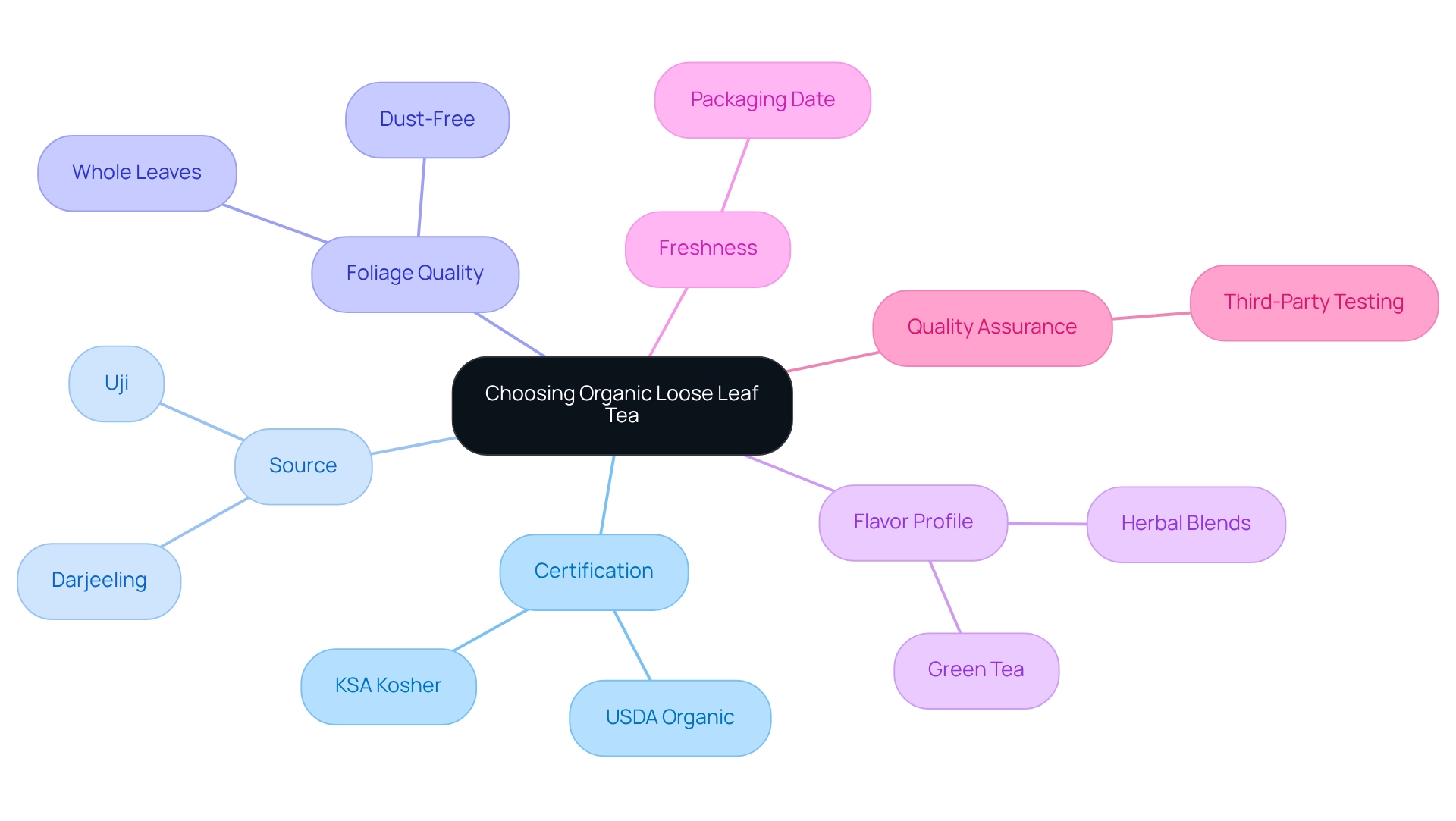
Step-by-Step Brewing Techniques for Optimal Flavor and Benefits
To prepare organic loose tea effectively and savor its complete flavor and health advantages, particularly from premium organic and Ayurvedic blends, please follow these essential steps in this user guide:
-
Measure the Tea: Start with approximately 1 teaspoon of Gardenika's loose tea for every 8 ounces of water. This ratio ensures a balanced brew that highlights the unique characteristics of our carefully crafted blends, designed to promote wellness and balance.
-
Heat the Water: The temperature of the water is crucial for optimal extraction. Different types of tea require specific temperatures:
- Green tea: 160-180°F (70-80°C) for a delicate flavor and to preserve antioxidants, supporting your body's natural processes.
- Black tea: 200-212°F (93-100°C) to fully release its robust flavors, enhancing your relaxation experience.
- Purple tea: Brew at 175-180°F (80-82°C) for a low-caffeine option rich in antioxidants, perfect for immune support.
-
Steep the Tea: Pour the hot water over the tea leaves and allow them to steep for the recommended duration:
- Green tea: 2-3 minutes for a refreshing taste.
- Black tea: 3-5 minutes for a stronger infusion.
- Herbal teas: Typically require longer steeping times, around 5-7 minutes, to extract their full flavor and benefits. For enhanced antioxidant capacity and higher yields of vitamins, consider lowering the extraction temperature to around 20 °C and brewing for 12 hours with distilled water, especially when using whole leaves.
-
Strain and Serve: After steeping, filter the tea using a fine mesh strainer or a tea infuser. Enjoy your tea as is or elevate it with natural sweeteners such as honey or a hint of lemon for extra taste, in line with our commitment to natural ingredients.
Re-steep: Many of our loose teas can be re-steeped multiple times. Each infusion of organic loose leaf tea reveals different flavor profiles, allowing you to explore the tea's complexity and depth, further promoting your wellness journey. By following these guidelines, you can brew your organic loose leaf tea to perfection, maximizing both its flavor and health benefits. Remember, the right brewing techniques not only enhance your tea experience but also align with the principles of wellness that we embody. Our beverages are USDA Organic and Kosher certified, ensuring the highest quality. Investing in quality tea preparation tools, such as a boiling water tap priced at £99, can further elevate your tea brewing experience. Furthermore, our dedication to sustainable practices and packaging guarantees that your selection of tea benefits both your well-being and the planet. Discover our selection of beverages and subscribe to our email list for exclusive deals!
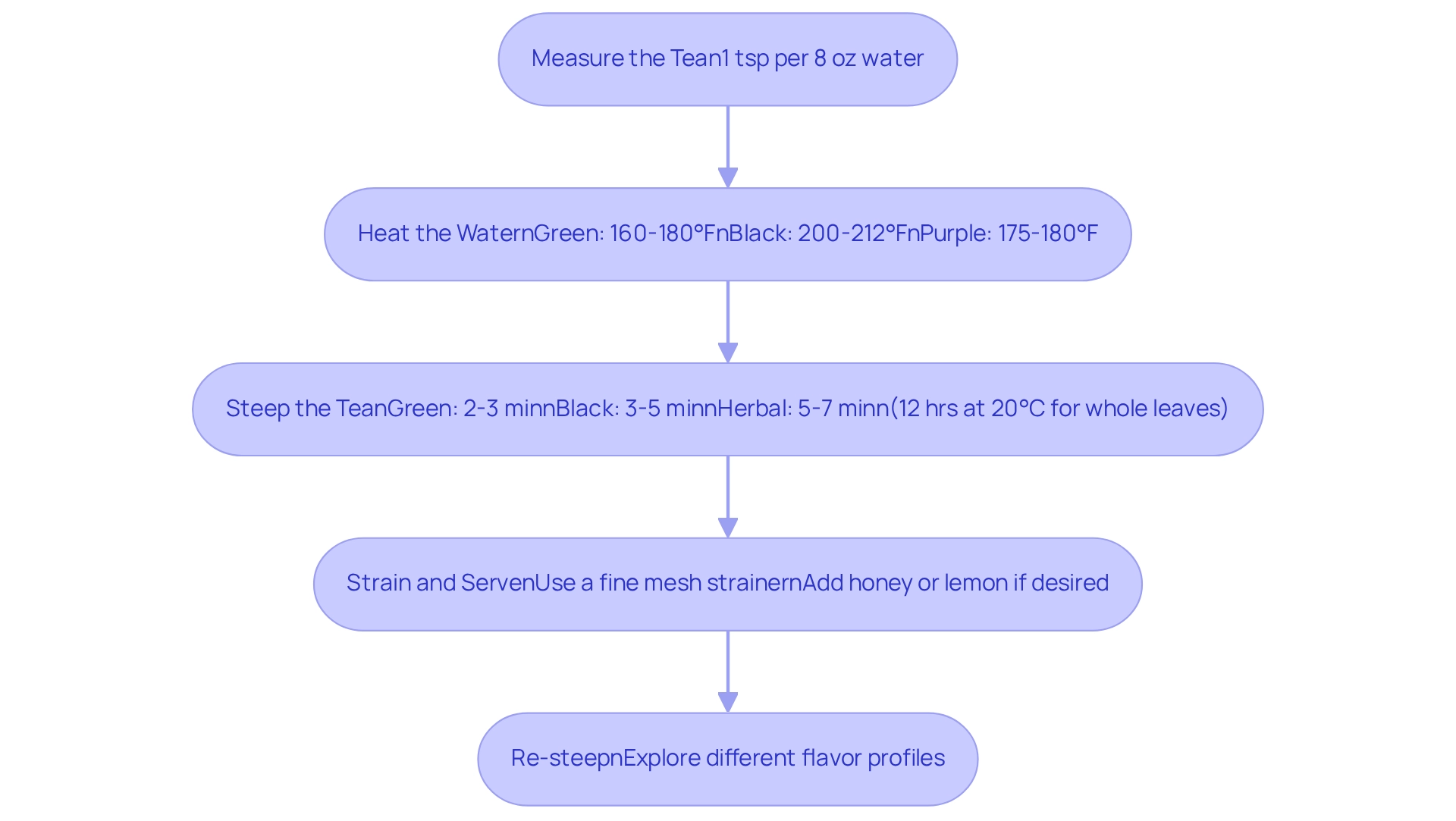
Exploring Different Types of Organic Loose Leaf Teas and Their Health Benefits
Organic loose leaf teas come in a variety of types, each offering distinct health benefits that cater to your unique wellness needs. At Gardenika, we are committed to promoting holistic wellness through natural ingredients crafted with time-tested herbs.
-
Green Tea: Renowned for its high antioxidant content, green tea is celebrated for its ability to boost metabolism and support weight loss. Recent studies indicate that regular consumption may also lower the risk of neurodegenerative diseases, such as Parkinson's. Imagine enjoying a cup of green tea, knowing it may protect your brain health while helping you stay vibrant and active.
-
Black Tea: Rich in flavonoids, black tea is linked to improved heart health. Research suggests that it may help lower cholesterol levels and reduce the risk of cardiovascular diseases, making it a heart-friendly choice. Think about the comfort of sipping black tea, knowing you're nurturing your heart with each delightful sip.
-
Herbal Teas: Varieties like chamomile and peppermint are not only soothing but also beneficial for digestive health and relaxation. These herbal blends can be a wonderful addition to your wellness routine, especially if you're seeking natural remedies for stress and digestive issues. Have you ever experienced the calming effect of chamomile after a long day?
-
Oolong Tea: This partially fermented tea is known for its ability to aid in weight management and enhance mental alertness. Its unique processing method allows it to retain beneficial compounds that support overall health. Picture yourself feeling energized and focused, all thanks to a comforting cup of oolong tea.
-
Tulsi Tea: An integral part of Ayurvedic practices, Tulsi (Holy Basil) is revered for its stress-relieving properties and immune support. This tea not only promotes relaxation but also helps your body adapt to stressors. Imagine how valuable it would be to incorporate Tulsi tea into your daily routine, fostering resilience and tranquility.
As Hasan Mukhtar, a prominent cancer researcher, notes, "This article describes the evidences from clinical and epidemiological studies in the prevention of chronic diseases like cancer and cardiovascular diseases and general health promotion associated with tea consumption." By exploring these varied kinds of organic loose leaf tea, you can uncover blends that excite your palate while enhancing your overall health and well-being. Gardenika, as a leader in the natural tea market, provides premium organic loose leaf tea choices that are health-focused, ensuring that each blend supports your body's natural processes and promotes balance and wellness.
Shop now to enjoy the advantages of our USDA Organic and Kosher certified loose teas, and take a step towards nurturing your health with every sip.
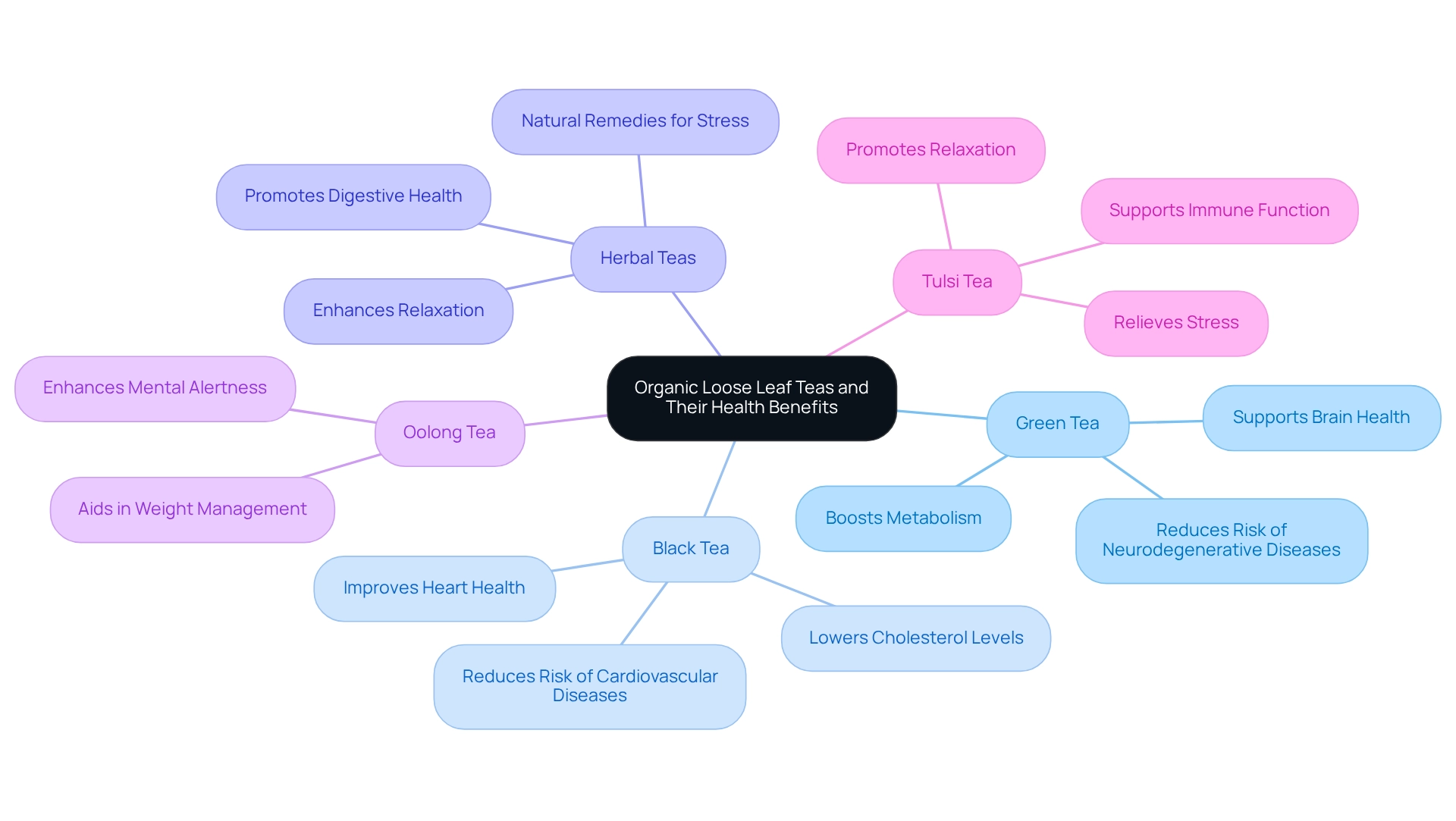
Frequently Asked Questions About Brewing Organic Loose Leaf Tea
Here are some commonly asked questions about brewing organic loose tea that can enhance your tea experience:
-
How much tea should I use? A general guideline is to use 1 teaspoon of loose tea for every 8 ounces of water. This ratio helps achieve a balanced flavor without overwhelming your palate. Remember, 45% of tea consumers are classified as 'Undemanding tea consumers,' highlighting the importance of proper brewing techniques to enhance your experience.
-
What is the best water temperature? Different types of tea require specific brewing temperatures to unlock their full flavor potential. For instance, green tea is best brewed at lower temperatures, typically between 160-180°F, while black tea can be steeped at boiling point, around 200-212°F. Using the correct temperature is crucial to avoid bitterness and enhance the tea's natural flavors.
-
How long should I steep my tea? Steeping times vary depending on the type of tea. Green tea generally requires a steeping time of 2-3 minutes, while black tea can be steeped for 3-5 minutes. Adjusting the steeping time allows you to control the strength and flavor of your brew, ensuring each cup is just right for you.
-
Can I re-steep my tea? Yes, many loose teas can be re-steeped multiple times. Each infusion can reveal different flavor notes, providing a unique tasting experience with each cup. This offers a delightful opportunity to explore the nuances of your favorite teas.
-
What should I do if my tea is too bitter? Bitterness in tea often results from over-steeping or using water that is too hot. To remedy this, try reducing the steeping time or lowering the water temperature. This modification can greatly enhance the taste profile, enabling you to enjoy a smoother, more enjoyable cup.
These FAQs are intended to elevate your tea brewing experience with organic loose leaf tea, ensuring you fully recognize the health advantages and delightful tastes it offers. As a gentle reminder, always pay attention to the brewing instructions on tea packaging to avoid common mistakes. With the company's dedication to quality and sustainability, you can trust that each blend is designed to deliver the best possible experience.
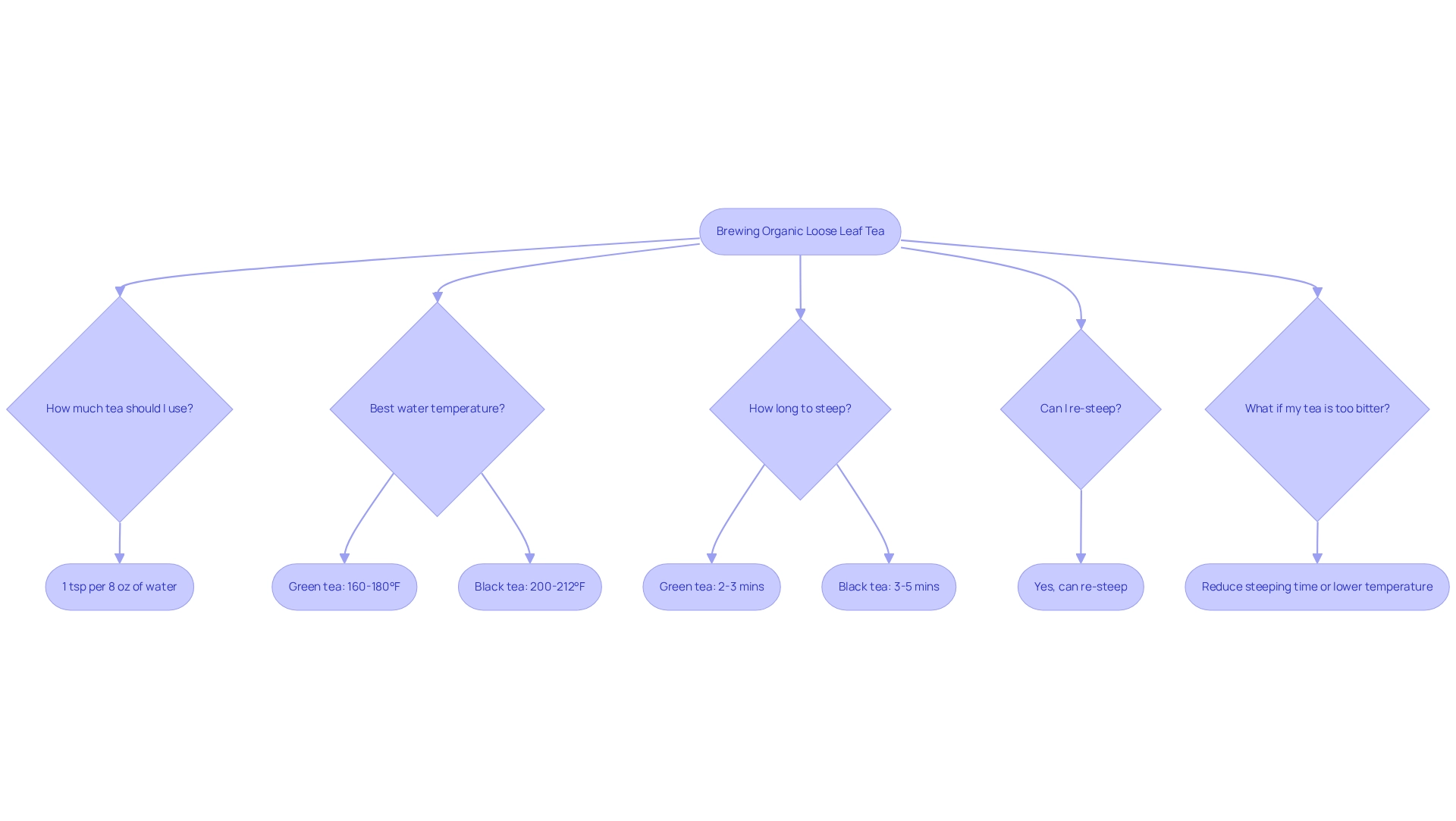
The Importance of Quality and Sustainability in Organic Tea Selection
When selecting organic loose leaf tea, prioritizing quality and sustainability is essential for both your health and the planet's well-being.
Quality: High-quality organic teas, such as those from Gardenia, are sourced from reputable farms that prioritize the health of their plants and the surrounding ecosystem. Look for certifications like USDA Organic and KSA Kosher, which ensure that the tea meets rigorous quality standards. The company’s commitment to natural sourcing and eco-friendly practices shines through in the over 2000 five-star reviews they have received, reflecting customer satisfaction and trust. Each batch of tea is tested by an independent laboratory, ensuring that you can enjoy every sip with confidence.
Sustainability: Choosing organic loose leaf tea supports sustainable farming practices that protect ecosystems and minimize the use of harmful chemicals. This not only benefits the environment but also guarantees that the tea you savor is free from pesticides and other harmful substances. Current trends reveal a growing consumer preference for brands that embrace eco-friendly practices, aligning with the rising demand for health-conscious products. As tea trader and taster Saidur Rahman observes, "Brands that emphasize openness, utilize eco-friendly practices, and align with health-consciousness are those most likely to thrive in the long run."
Supporting Local Farmers: Many natural tea brands, including Gardenika, collaborate directly with small farmers, promoting fair trade practices and bolstering local economies. This not only enhances the quality of the tea but also nurtures community development and sustainability.
By focusing on quality and sustainability in your tea choices, you contribute to a healthier planet while enjoying the full benefits of organic loose leaf tea. Real-world examples, such as the evaluation of tea plantations in Tanzania, emphasize the significance of sustainable practices in preserving soil health and biodiversity, further highlighting the value of selecting organic loose leaf tea.
Explore our range of teas, including Anti-Inflammatea Loose Leaf Tea for $12.90 and Decongest Loose Leaf Tea for $13.90. Join our email list to receive an exclusive offer. Shop now and take a step towards a healthier you!
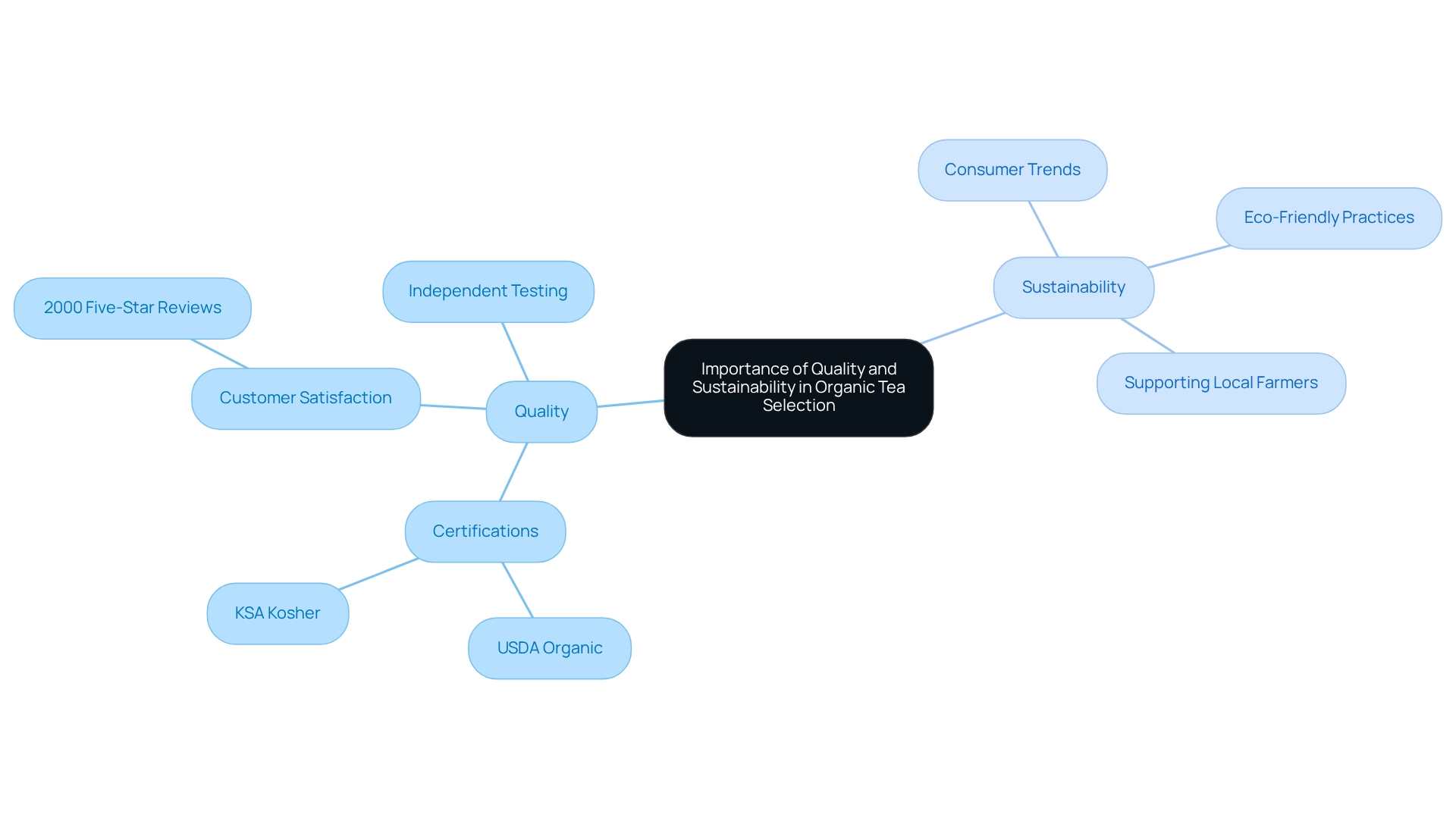
Conclusion
Organic loose leaf tea is a vibrant choice for anyone embracing health and sustainability. With its numerous benefits—promoting wellness, relaxation, and being rich in antioxidants—it’s an ideal addition to any health-conscious lifestyle. By meticulously selecting high-quality organic teas based on certification, source, and freshness, you empower yourself to make informed decisions that resonate with your values.
Brewing these delightful teas using proper techniques not only enhances their flavor but also maximizes their health benefits, allowing for a richer tea experience. The diversity among organic loose leaf teas, each offering unique health advantages, caters to a wide range of wellness needs and personal preferences.
Ultimately, choosing organic loose leaf tea supports your personal health and contributes to sustainable farming practices that benefit both the environment and local communities. As the demand for quality, eco-friendly products continues to grow, embracing organic loose leaf tea is a meaningful step towards a healthier lifestyle and a more sustainable future. Explore the wonderful world of organic teas and discover how these nourishing blends can elevate your daily routine.
Frequently Asked Questions
What is organic loose leaf tea and how is it different from conventional tea?
Organic loose leaf tea is crafted from whole tea leaves grown without synthetic pesticides and fertilizers, making it a superior choice compared to conventional tea.
What are the health benefits of organic loose leaf tea?
Organic loose leaf tea promotes wellness and balance, is rich in antioxidants that combat oxidative stress, enhances flavor due to the whole leaves expanding during brewing, and offers specific health advantages such as aiding digestion and boosting immunity.
How does organic loose leaf tea support wellness?
The blends are thoughtfully created with time-tested herbs that support the body's natural processes, encouraging relaxation and bolstering the immune system.
What makes organic loose leaf tea richer in antioxidants compared to conventional tea?
Research shows that the antioxidant levels in organic loose leaf tea can be significantly higher than those found in conventional tea, enhancing their health-promoting properties.
What should I consider when selecting organic loose leaf tea?
Key factors include certification (look for USDA Organic and KSA Kosher), source (origin of the tea), foliage quality (appearance of the leaves), flavor profile (personal taste preferences), freshness (packaging date), and quality assurance (third-party lab testing).
Why is USDA Organic certification important?
USDA Organic certification guarantees that the tea is cultivated without harmful chemicals or synthetic fertilizers, ensuring sustainability for both consumers and the environment.
How can the geographical source of tea affect its quality?
Premium teas are often sourced from prestigious areas known for distinctive flavor profiles and farming methods, which can significantly influence the tea's taste and quality.
How can I ensure the freshness of organic loose leaf tea?
Always check the packaging date and aim to buy tea that has been packaged within the last six months to retain optimal flavor and health benefits.
What is the significance of quality assurance in organic loose leaf tea?
Quality assurance ensures that each batch undergoes third-party lab testing for safety and quality, allowing consumers to trust that each sip is pure and dependable.
Why is sustainability an important aspect of choosing organic loose leaf tea?
Choosing natural tea supports eco-friendly agricultural methods and sustainable packaging, contributing positively to the environment and reflecting a commitment to health and environmental responsibility.


